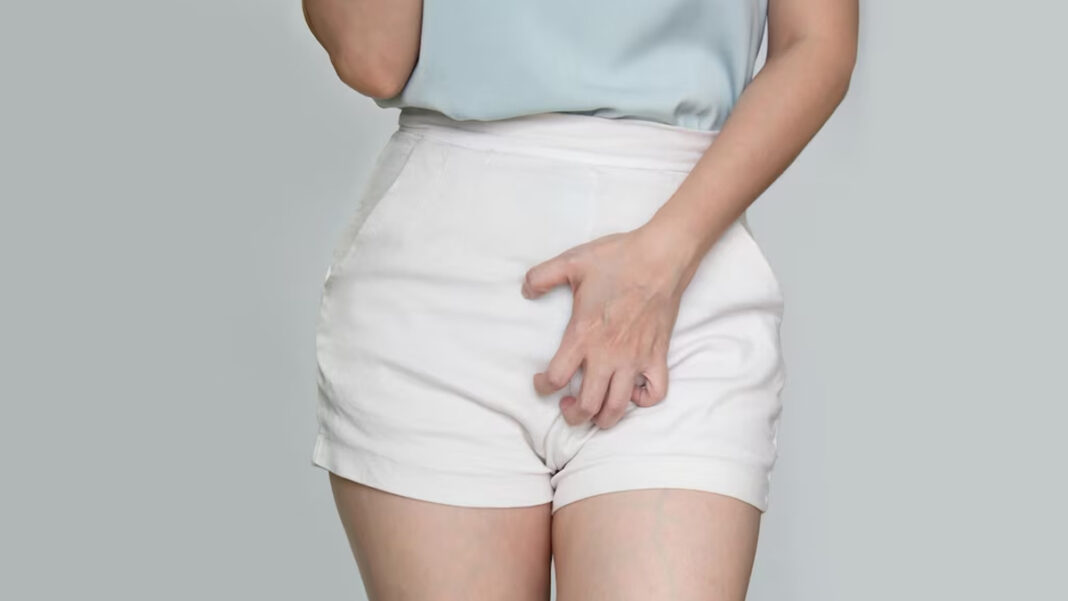It is not often that we see people discussing their issues with vaginal acne, out of a fear of embarrassment. However, it is a common concern that causes discomfort and shame for those affected. Hence discussing its causes and remedies can help tackle the stigma against it and provide necessary relief to the affected individuals. The same sentiment has been medically vouched for, in the study titled Acne: more than skin deep, which states, ‘Health education should ensure that patients have accurate information of the causes of acne and also that they have realistic expectations about the time frame and probable results of treatment. Better education and care given by medical staff will allow them to treat themselves more effectively.’ What Causes Vaginal Acne? Talking to the team of OnlyMyHealth, Dr Vijaya Gowri Bandaru, Visiting Consultant – Dermatology, Sakra World Hospital, Bengaluru, defined “Vaginal acne termed folliculitis refers to hair follicles in the vulvar area that become clogged with oil, dead skin cells, and bacteria.” This can lead to the development of red, inflamed bumps, similar in appearance to facial acne. As your genital area also receives less air, higher levels of bacteria, and is comparatively more humid than the rest of the body, vaginal acne usually takes longer to heal, gets easily infected and inflamed, and leaves behind nasty marks. Some of the causes of vaginal acne are: Sweating: The vaginal area has many sweat glands, and excess sweating can contribute to clogged follicles. Friction: Tight clothing or activities that cause friction in the genital area can lead to irritation and acne. Poor Hygiene: Inadequate cleansing of the vulvar area can allow oil and bacteria to accumulate, leading to acne. Hormonal Fluctuations: Hormonal changes, such as those occurring during menstruation, pregnancy, or menopause, can trigger acne breakouts. Shaving or Waxing: Hair removal methods like shaving or waxing can cause irritation, and ingrown hair, and lead to folliculitis or acne. Treatment of Vaginal Acne Treating vaginal acne is quite similar to treating any other acne. Informing about the steps that you should follow to treat vaginal acne, Dr BandaruIt advised abstaining from waxing or shaving while following these steps: Maintain Good Hygiene: Regularly cleanse the vulvar area with mild, fragrance-free soap to keep it clean and prevent bacterial buildup. Wear Breathable Clothing: Opt for cotton underwear and loose-fitting clothing to reduce sweat and friction, allowing the skin to breathe. Avoid Over-cleansing: While maintaining hygiene is crucial, excessive washing can strip the skin of its natural oils, and make it prone to friction burns. Warm Compresses: Applying a warm, moist cloth to the affected area can help soothe inflammation and encourage drainage of clogged follicles. Topical Treatments: Over-the-counter creams containing benzoyl peroxide or salicylic acid can help unclog follicles and reduce inflammation. Doctor’s Guidance: If acne persists or worsens, consult a healthcare professional who can recommend prescription medications or antibiotics in the form of tablets, creams, and washes. How to Prevent Vaginal Acne Precaution is always better than cure. Hence, Dr Bandaru suggested a few ways through which you can minimise the formation of vaginal acne altogether: Choose Gentle Products: Opt for fragrance-free and hypoallergenic products for intimate hygiene. Avoid Tight Clothing: To prevent friction that can cause boils, avoid wearing undergarments for too long. Choose loose, breathable cotton underwear to let air flow and reduce friction. Don’t wear tight clothes that trap moisture and encourage bacteria. Practice Safe Hair Removal: If you choose to shave or wax, ensure proper techniques, hygiene, and aftercare to prevent irritation. Maintain Hormonal Balance: Healthy lifestyle habits, such as regular exercise and a balanced diet, can help stabilize hormonal fluctuations. Regular Check-ups: If you experience recurrent or severe acne, consult a healthcare provider to rule out any underlying medical conditions. Hydration: Drink plenty of water to keep your skin hydrated, and supple to minimise friction. Eat a Healthy Diet: Enhancing one’s immune system plays a crucial role as a natural remedy for managing folliculitis. Eat foods that are rich in beta carotene, vitamin C, vitamin D, zinc, probiotics, and protein. Vaginal acne can be distressing and detrimental to one’s self-esteem. But understanding its causes and exploring effective treatments and preventive measures, can help you manage and alleviate the symptoms. Remember, it’s essential to consult a healthcare professional for personalised advice, especially if the condition persists or worsens. Read NextPost Workout Skincare: Expert Lists Effective Routine To Prevent BreakoutsDisclaimer All possible measures have been taken to ensure accuracy, reliability, timeliness and authenticity of the information; however Onlymyhealth.com does not take any liability for the same. Using any information provided by the website is solely at the viewers’ discretion. In case of any medical exigencies/ persistent health issues, we advise you to seek a qualified medical practitioner before putting to use any advice/tips given by our team or any third party in form of answers/comments on the above mentioned website.
Getting Rid of Vaginal Acne: Dermatologist Explains Causes and Treatment of Genital Pimples
